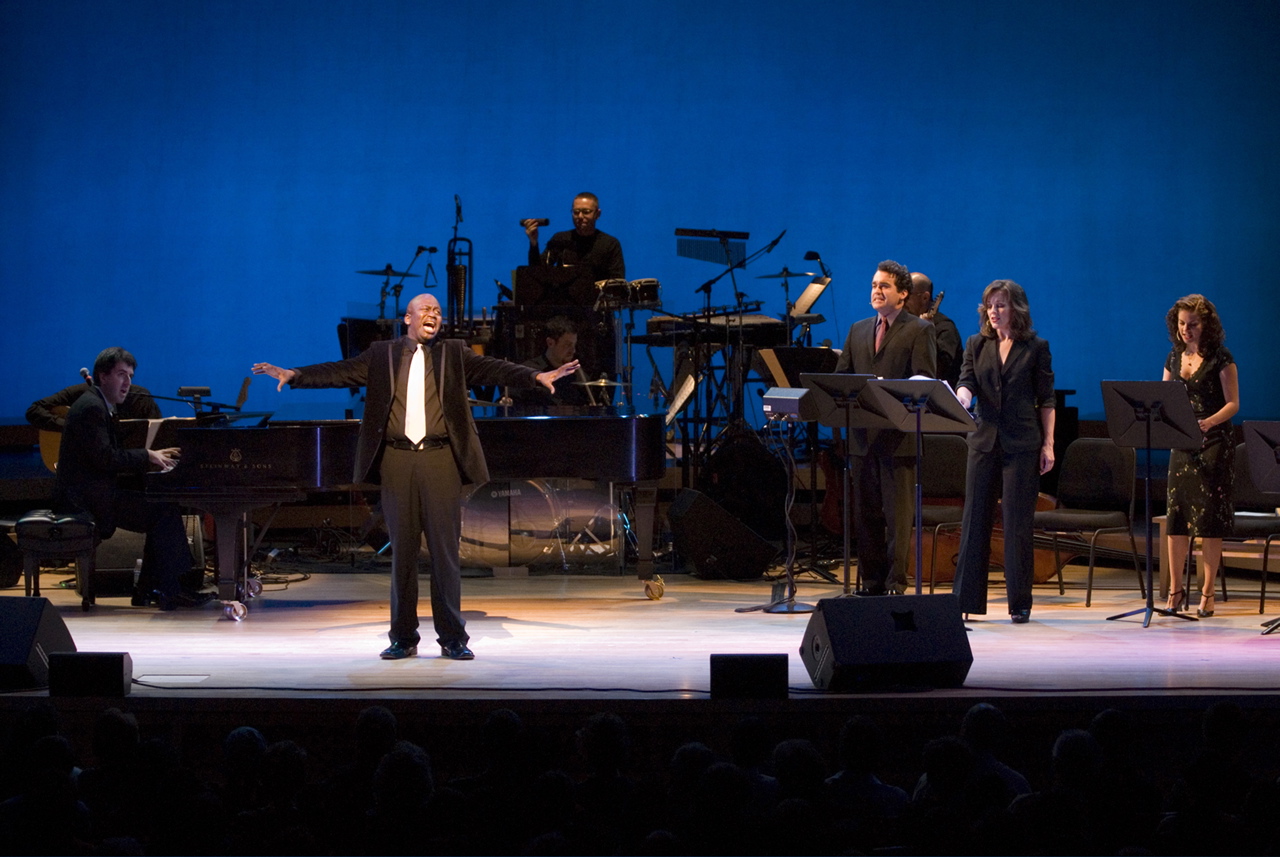Posted on May 18, 2007 at 9:02 pm

l to r: JRB, Gary Sieger (obscured), Tituss Burgess, Brian Dunne, Shawn Galvin, Brian d’Arcy James, Randy Landau (obscured), Alice Ripley and Laura Griffith in Songs for a New World at the Strathmore Music Center, May 16, 2007
Photo by Margot I. Schulman.
Celia Wren’s review here.
Exhilarating ‘Songs for a New World’
By Celia Wren
Special to The Washington Post
Friday, May 18, 2007; C06
The siren call of possibility echoed from the stage at Strathmore on Wednesday, when Jason Robert Brown’s Songs for a New World received a glitzy concert staging, co-produced by Signature Theatre.
Musical theater darlings Brian d’Arcy James and Alice Ripley, with fellow Broadway performers Laura Griffith and Tituss Burgess, filled the vocal roles of the 1995 revue, a constellation of songs dealing with themes of decision, transformation and renewal. The performers shared the stage with a band led by another celebrity: Brown himself. The esteemed composer-lyricist directed four other instrumentalists from a grand piano, thumping the keyboard, tapping his feet and bobbing his head with abandon as the score wound through its many shifts in mood and style, from jazz through pop and gospel to a vamping pastiche of German cabaret.
Brown’s expressive playing — and, more critically, an unfortunate imbalance in the acoustics — turned the band into the star of the opening-night performance. The singers vied to make themselves heard above the accompaniment, but lyrics were now and then inaudible. The band particularly tended to drown out the male vocalists; Griffith and Ripley fared somewhat better.
The acoustical discrepancy may well have been a one-night problem, and in any case it didn’t obscure the seductiveness of Songs for a New World, a work that, along with the Tony-winning Parade, helped place Brown in a select group of composers frequently cited as the future of musical theater. (Daisy Prince, who directed the original off-Broadway production, is credited with conceiving the show.) Signature Theatre Associate Director Michael Baron directed the Strathmore event, and he certainly didn’t clutter up the event with stage business.
While a background scrim shifted from one deep color to another, the singers stood quietly, now and then giving a token nod to drama with a look or hand gesture. The fetching Ripley (Side Show, Arena’s Shakespeare in Hollywood), who delivered some of the score’s more theatrical songs, did undertake a few in-character wobbles in “Just One Step,” a brassy number in which a materialistic housewife, peeved at her husband, threatens to leap from a penthouse on the 57th floor. Among her other turns, Ripley also gave a poignant airing to “Stars and the Moon,” a bittersweet reflection on lost love that has become a cabaret favorite.
Griffith (taking the place of the previously announced Laura Benanti) brought soaring tunefulness to her numbers, including memorable portions of “The New World,” the show’s stirring introduction. James played up the wise-guy persona of the character in the opening of “The River Won’t Flow,” an infectious toe-tapper packed with skepticism about the American Dream, and he took the lead in other songs. But one hungered for additional unrestrained moments from this acclaimed performer (The Lieutenant of Inishmore, Sweet Smell of Success).
Burgess (Jersey Boys) had the hardest time competing with the instrumentalists, which leached much of the power from his moments in the spotlight, including “The Steam Train,” a sketch about an ambitious basketball player, and “On the Deck of a Spanish Sailing Ship, 1492,” a melancholy spiritual.
The “Sailing Ship” number, the second in the show, is among its most moving songs, the image of the ship fitting beautifully with now-wistful, now-insistent rippling, churning sounds that turn up often in other parts of the exhilarating score. Above all, the historical allusion provides an ingenious — and vivid — example of Brown’s key theme: the euphoria and terror that come with moving into life’s uncharted waters. Songs for a New World reminds us that each human being is the Columbus of his or her experience.
No comments yet. You should be kind and add one!
The comments are closed.